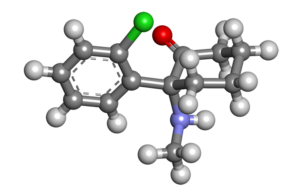
3d model of Ketamine from Wikimedia Commons
Interest in the dissociative anesthetic ketamine is surging, given its potential to treat treatment-resistant depression and other mental health disorders.
Against that backdrop, the American College of Clinical Pharmacology (ACCP) have released two policy statements advocating for stricter use of the drug. In addition, ACCP is arguing against its use in non-medical settings such as law-enforcement contexts where the drug is used as a forced sedative.
One of the ACCP statements concludes that the drug has an unfavorable risk–benefit profile. The ACCP observes that not only does ketamine have a significant potential for abuse, it has been linked to drug-drug interactions that could pose a safety risk.
Furthermore, the drug can lead to elevations in blood pressure and pulse. As a result, ACCP suggests that a licensed physician with advanced life support certification administer the drug.
A number of websites have popped up in recent years offering online consultations to provide at-home ketamine therapy.
The paper also notest that the FDA formally reviewed the use of the drug for any psychiatric indication. Psychiatric uses of the drug are also not subject to formal postmarketing surveillance.
ACCP also notes that the use of the related drug Spravato (esketamine) is available only through a restricted distribution system given its risk of serious adverse outcomes.
That drug has been associated with increases in blood pressure and embryo-fetal toxicity.
In November 2021, The New York Times ran an article highlighting the surge in interest in ketamine while also raising potential safety concerns regarding the uptick in its use to treat depression and similar conditions.
Meanwhile, the amount of data related to off-label use of the drug is growing.
For instance, the healthcare technology Osmind recently announced positive results from a retrospective real-world analysis of ketamine infusion therapy for depression published in the Journal of Affective Disorders.
Additionally, a recent Phase 2 study published The American Journal of Psychiatry found that the drug offers promise in treating alcoholism.